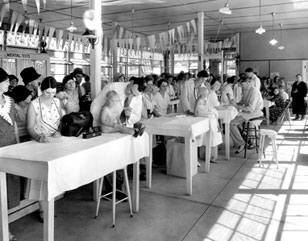Last modified: Wednesday, September 22, 2010
Do better babies make better Hoosiers?
FOR IMMEDIATE RELEASE
Sept. 22, 2010
BLOOMINGTON, Ind.---The September 2010 special issue of the Indiana Magazine of History examines Indiana's leadership in the early 20th-century practice of eugenics -- the effort to breed a better human race.
Guest editor Alexandra Minna Stern, professor in the History of Medicine at the University of Michigan, considers the example of the popular Indiana State Fair Better Baby Contest, which favored "educated white families and their ideally robust children." Through a variety of such institutions, programs, and laws, Stern writes, "ideas of biological betterment found uniquely fertile soil in the Hoosier Heartland."

Photo courtesy of the Indiana State Archives
Contestants get ready for the Better Baby Contest at the 1931 Indiana State Fair.
Jennifer Burek Pierce, assistant professor in the School of Library and Information Science at the University of Iowa, examines Hoosier public health pioneer John N. Hurty, a leading eugenics proponent. Hailed during his long career as "Indiana's most useful citizen," Hurty left a positive legacy of improved public sanitation and health practices. Burek Pierce, however, also uncovers Hurty's support of eugenic practices including sterilization laws, which would have forced the procedure on convicted criminals and the mentally handicapped.
In the late 1910s and early 1920s, the Indiana Committee on Mental Defectives -- an organization based on eugenic theory -- sent women field workers across the state examining the living conditions and behaviors of Indiana's poorest citizens. Kendra Clauser-Roemer, development chair for the History Educators Network of Indiana, looks at the role played by these women in moving state policy away from mere condemnation of the poor to an approach which favored sympathetic intervention.
In the issue's final article, Robert Osgood, professor of education at Muskingum University, examines the impact of early eugenic policies on Indiana public education, from teacher training to student evaluation. Osgood highlights the use of intelligence tests to identify and segregate poor students (negative eugenics), and looks at early programs for gifted students (positive eugenics).
The Indiana Magazine of History is published quarterly by the history department of Indiana University Bloomington. The magazine's website can be found at https://www.indiana.edu/~imaghist. For general information on the articles, contact the editorial office of the magazine at 812-855-4139.